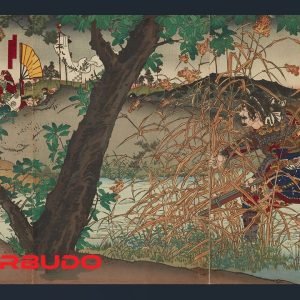Before delving into the forthcoming translated segment of the Yasuda Ryū ninjutsu densho, it is crucial to elucidate the subject of the next chapter: Okidōgu (置道具). Uncommon in the realm of ninjutsu or military strategy, this term finds its roots in the world of theater and drama. The enigmatic author of the densho appears to employ it in an artistic manner, suggesting that the battlefield serves as an expansive stage upon which warriors execute their lethal skills.
In theatrical contexts, okidōgu refers to movable props that adorn a stage, ranging from substantial objects like furniture to smaller items such as ashtrays. It is occasionally termed de-dōgu (出道具) or “stage props.” Intriguingly, for the seamless execution of infiltration and attack, okidōgu must be meticulously placed in predetermined positions. The orchestration of this “backstage work” in war demands precision and attention to detail akin to the intricate preparations required in theatrical productions.
This juxtaposition of martial and theatrical elements underscores the author’s artistic approach to portraying warfare. It not only provides insight into the mindset of the warriors but also highlights the parallels between the meticulous choreography of a stage performance and the calculated strategies employed on the battlefield. The choice of terminology adds a layer of complexity, inviting readers to view the artistry in the application of deadly skills, further enriching the understanding of Yasuda Ryū ninjutsu.
口伝 置道具の事
Kuden regarding Okidōgu
一、 忘れても丸く動き、置道具を探すべからず。 方向がわからなくなり、敵地に近付く恐れあり。
一、置道具をさがしおる時、敵の者に見られない事。
一、 一人でも男、女、 子供に会えば、それより反対の方に(出来れば敵の方に行来道をと
置道具には口伝あり。
Even if you forget and are going in circles, and don’t keep looking for your okidōgu. You may lose your bearings and unexpectedly approach enemy territory.
When you are looking for your okidōgu, do not be seen by the enemy.
If you see a man, woman, or child, go in the opposite direction (preferably toward the enemy) and be careful not to be suspected by that person. Oral tradition – Give up any okidōgu in this direction.
There are oral traditions about okidōgu.
置道具の事(置き所) (茂みの木がよし)。
木に置道具を仕掛け忍ぶには秋口冬悪き時あり。 秋口なれば、木の葉落ちて置道具下よりよく見えるなり、
Placement of okidōgu (in a bush-like tree is good).
There are bad times to place tools in trees, such as early autumn and winter. In early autumn, leaves fall from the trees, and you can see the tools clearly from below. In winter, after snow falls and the trees and their surroundings are white, it makes it difficult to find them. Also, if you can see my figure moving about or footprints revealing my heading, you must be very careful. Hang them up in a tree with a line. Don’t tie them at the height of the enemy’s face.
一、木の根より五尺か六尺をあけおく事。 それより下に糸を止めたなれば、敵より見付けられる恐れあれば、
Leave a gap of 5 or 6 feet from the roots of the tree. If you tie the line lower than that, the enemy may find it. Don’t forget this!
一、降ろす時、 途中の木の枝にかからぬような所によいな。
When you lower the okidōgu, do not let it get caught in the branches of the tree on the way down.
一、森の中ではよく迷うものなれば、なため (木に)を入れればよけれども、
If you often get lost in the forest, you can place a marker (on a tree), but the enemy may see this sign and follow you. You must decide whether to put the mark up after careful consideration.
一、なためは夜光るものなれば、道印にはよきものなれど、 危なし あぶなし。
If you use something that glows or shines at night, although it is a good way to find your path, it is dangerous.
一、手傷をおいし時の事を考え、仕掛をする事。 手傷おえば、木には登れず。 よいな。
Think about the possibility of getting an injury during a crucial time, such as when needing to set traps. If you are injured, you will not be able to climb trees. Understood?
一、置道具の置場は、
Even if you are a member of the same team, you must not tell anyone where you have left your okidōgu, and if you do, throw them away (don’t use them).
一、その者、置道具を捜す姿が敵の眼に立つ事なれば、危なし。
If the enemy sees you searching for your okidōgu, you are in danger.
一、 敵後より来る者をとの気で、待ち伏せままあり。 用心のため捨てる事、忘るるなよ。
Expecting you to come from behind, the enemy will be waiting in ambush in that direction. (If your okidōgu is in that direction) As a precaution throw them away. Don’t forget this!
Sean Askew
Dōtō 導冬 – Winter’s Guide
BKRBUDO 1/24/2024





